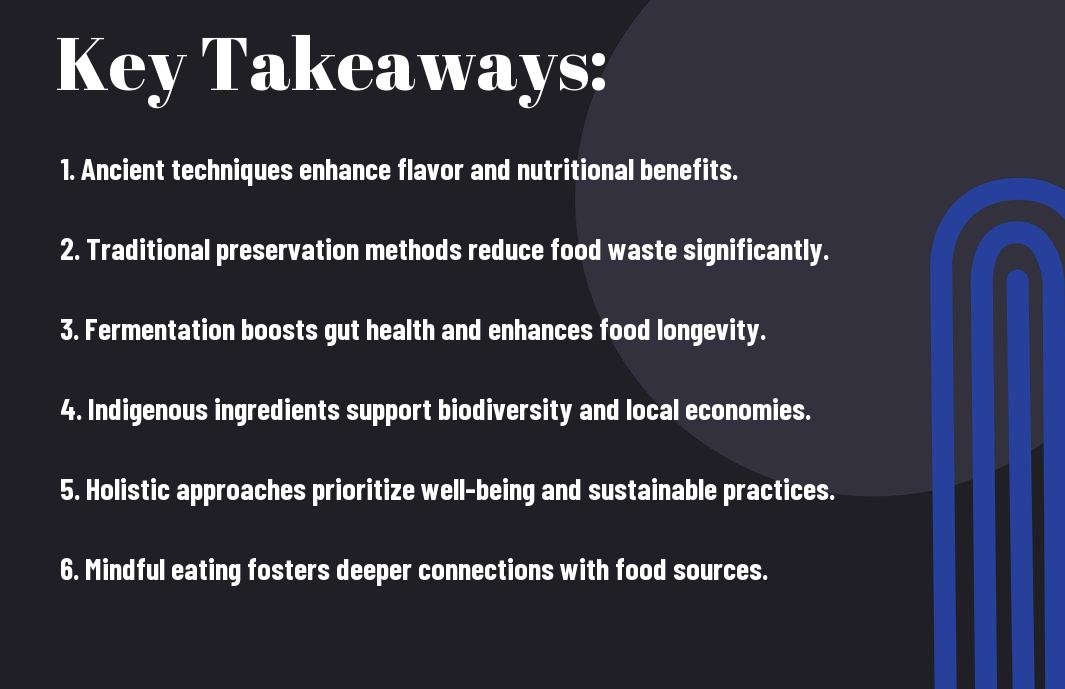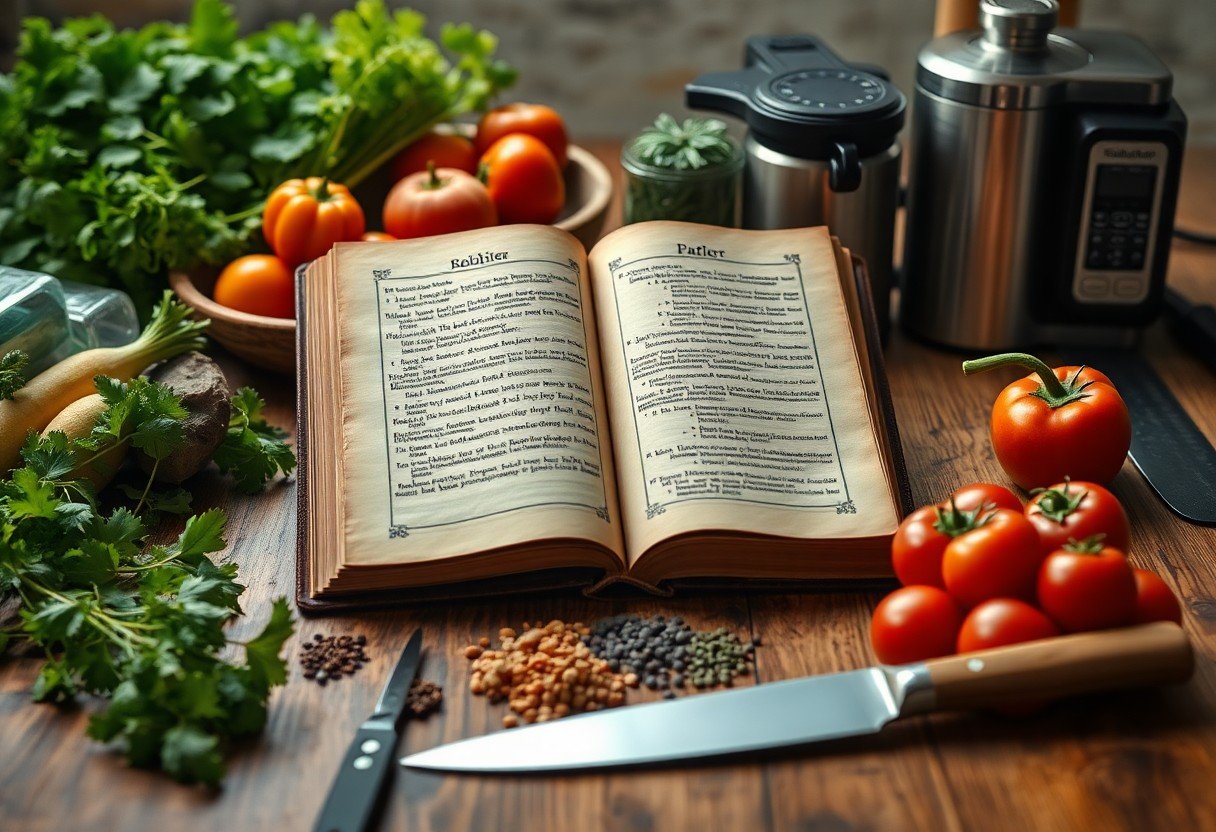Over the years, many of the culinary practices from ancient cultures have been overshadowed by contemporary food trends. Yet, embracing this ancient culinary wisdom can provide you with insight into healthier eating habits and sustainable cooking methods. By blending these time-honored techniques with modern innovation, you can enhance your culinary skills and improve your overall well-being. In this post, you will discover how ancient recipes and cooking methods can positively influence your approach to food in today’s fast-paced world.

The Historical Context of Culinary Practices
A deep understanding of the historical context of culinary practices is necessary for appreciating how food traditions have evolved. Over centuries, various cultures have developed unique cooking methods and ingredients that reflect their environmental conditions, available resources, and social structures. By exploring these historical narratives, you can uncover the rich tapestry of techniques and knowledge that still influence how you approach cooking today.
Traditional Techniques and Their Origins
Culinary practices often have their roots deeply embedded in geography and culture. Traditional techniques, such as fermentation, smoking, and drying, originated as methods for food preservation and flavor enhancement. You can trace these practices back to ancient communities, where available resources dictated the culinary innovations necessary for survival. Exploring these origins offers valuable insights that can enhance your cooking style and appreciation for food.
Influence of Ancient Civilizations on Modern Cuisine
Between ancient civilizations and contemporary culinary arts lies a profound connection. The techniques and flavors you enjoy today are often derivative of those first established by the Egyptians, Romans, and Greeks. These ancient cultures contributed ingredients, preparation methods, and even food philosophies that continue to shape kitchens worldwide.
It is necessary to recognize that ancient civilizations laid the groundwork for many of the ingredients and cooking methods you use in your kitchen. For example, the introduction of spices by the trade routes of the Romans influenced global cuisine, allowing you access to vibrant flavors. Moreover, traditional practices like pickling and cooking techniques like steaming or roasting were perfected by these civilizations and remain relevant in your culinary endeavors. Engaging with these historical influences allows you to enrich your cooking with techniques that have stood the test of time.
Nutritional Insights from Ancient Diets
The exploration of ancient diets reveals a treasure trove of nutritional insights that can enhance your contemporary eating habits. By understanding the balance of nutrients and the emphasis on whole, minimally processed ingredients, you can incorporate ancient wisdom into your daily meals. Many traditional diets emphasize plant-based foods, healthy fats, and fermented products, which can improve digestion and overall health. Thus, embracing these ancient dietary principles may provide a path to improved well-being in your modern life.
Health Benefits of Traditional Ingredients
Against the backdrop of processed foods dominating today’s diets, traditional ingredients shine with their health benefits. Many ancient cultures relied on native spices, grains, and herbs that possess potent anti-inflammatory and antioxidant properties. By integrating these time-tested ingredients into your cooking, you can fortify your meals with a wider array of nutrients, supporting better immune function and enhancing your overall health.
Lessons in Sustainability and Locavorism
Insights from ancient culinary practices reveal effective strategies for promoting sustainability and locavorism in modern food systems.
Traditional eating patterns often focused on seasonal and locally sourced ingredients, minimizing the environmental impact associated with food transportation. By cultivating relationships with local farmers and incorporating seasonal produce into your diet, you can not only enjoy fresher and more flavorful meals but also strengthen your community. This approach fosters biodiversity and encourages the preservation of traditional farming practices, ensuring that future generations can continue to enjoy nutritious, sustainable food options. Adopting these lessons not only benefits your health but also contributes positively to the planet.
Reviving Ancient Techniques in Contemporary Cooking
To embrace ancient culinary techniques is to infuse your modern kitchen with a wealth of knowledge that promotes sustainability, flavor, and health. By integrating time-honored methods, you can enhance your cooking experience and celebrate the rich history of gastronomy. You may find that these practices not only elevate your dishes but also connect you to a larger narrative of food, community, and tradition.
Fermentation and Preservation Methods
Across various cultures, fermentation has served as a vital technique for preserving food, enhancing flavors, and promoting gut health. By experimenting with fermentation processes like pickling, kimchi, or sourdough, you can introduce a new dimension to your meals while harnessing the benefits of beneficial bacteria. This ancient practice not only extends the shelf life of your produce but also transforms your dishes into complex, flavorful experiences.
Cooking Techniques: Slow Food vs. Fast Food
Slow food, rooted in ancient practices, emphasizes the value of taking time to prepare and savor meals, in stark contrast to fast food, which prioritizes convenience over quality.
Due to the rapid pace of modern life, fast food has become a prevalent choice, often leading to poor nutritional choices and health issues. In contrast, slow food encourages you to engage with your ingredients, appreciate traditional cooking techniques, and savor every bite. This approach fosters a deeper connection to your meals and promotes mindful eating, ultimately benefiting your overall well-being. By embracing the slow food movement, you nourish both your body and soul, bringing a rich, restorative experience to your culinary journey.

The Role of Cultural Preservation in Modern Gastronomy
Once again, the significance of cultural preservation in modern gastronomy cannot be overstated. By drawing from ancient culinary knowledge, you can explore diverse flavors and techniques that have been passed down through generations. This revitalization fosters a deeper appreciation of food’s origins and encourages you to embrace sustainable practices that honor the land and its resources. When you integrate these time-honored principles into contemporary cooking, your culinary creations become a celebration of heritage while also catering to modern tastes and nutritional needs.
Bridging Generational Knowledge
Between generations, culinary techniques and traditions often evolve, but the essence remains. You have the unique opportunity to tap into the wisdom of those who came before you, learning vital skills such as fermentation, preservation, and seasonal cooking. By actively participating in this exchange, you not only enhance your culinary repertoire but also forge deeper connections with your family and your cultural roots.
The Importance of Community in Culinary Heritage
Between individuals, community plays a pivotal role in preserving culinary heritage. By engaging with local food movements and cultural groups, you can share knowledge, recipes, and traditions that strengthen your ties to the past while fostering a sense of belonging. This collective effort nurtures the ongoing evolution of cuisine, reflecting the diverse experiences and values of those in your community.
Culinary heritage thrives within communities where individuals come together to share and celebrate their food traditions. You’ll find that this strong bond not only enhances your understanding of diverse culinary practices but also fosters a sense of identity. Engaging with local food systems encourages support for sustainable practices, strengthens interpersonal connections, and promotes cultural appreciation. The collective memory of recipes, techniques, and stories contributes to a vibrant culinary landscape, ensuring that the rich tapestry of traditions is preserved for future generations while allowing you to relish in the knowledge of those who came before.
Case Studies: Modern Chefs Embracing Ancient Wisdom
Many modern chefs are revitalizing their culinary practices by incorporating ancient wisdom. Here are some enlightening case studies:
- David Chang – Utilizes Japanese fermentation techniques to deepen flavors in his dishes.
- Alice Waters – Focuses on heirloom ingredients, inspired by ancient farming practices.
- Wylie Dufresne – Blends molecular gastronomy with New World cooking traditions.
- Dan Barber – Advocates for regenerative agriculture, aligning with traditional methods.
For more insights, explore How Ancient Food Strategies and Culinary Techniques ….
Notable Restaurants and Their Philosophies
After examining various eateries, you will discover that many renowned restaurants have adopted philosophies rooted in ancient practices. For instance, Blue Hill at Stone Barns champions local produce and traditional cooking methods, while Osteria Francescana pays homage to Italian heritage through innovative reinterpretations of classic recipes.
Influential Chefs and Their Culinary Journeys
Journeys through the culinary world reveal how influential chefs have triumphed by embracing ancient culinary techniques. These chefs often draw inspiration from their cultural roots and historical practices to create unique dining experiences that resonate with modern palates.
In fact, many chefs have faced tremendous challenges on their journeys, navigating the pressures of contemporary dining trends while trying to honor time-tested wisdom. For example, Grant Achatz utilized ancient preservation methods to enhance modern dishes, showcasing how innovation can exist alongside tradition. Their stories exemplify how blending ancient methods with contemporary culinary arts can yield delicious and sustainable outcomes that elevate your dining experiences.

Challenges and Opportunities in Integrating Ancient Wisdom
Despite the rising interest in ancient culinary methods, integrating them into modern food practices presents both challenges and opportunities. The key is to overcome barriers such as the reliance on processed ingredients and fast-paced lifestyles. However, you can Explore Native American Food Practices and Indigenous wisdom to find sustainable approaches that can enhance flavor and nutrition while respecting traditional techniques.
Modern Constraints on Traditional Techniques
Constraints such as limited resources, fast-paced consumer demands, and a lack of awareness about ancient culinary practices can hinder the adoption of traditional techniques. In your daily cooking, you may find it easier to rely on pre-packaged foods, which can overshadow the rich and satisfying flavors achieved through ancient methods.
Potential for Innovation through Ancient Practices
Integrating ancient techniques into contemporary culinary practices opens up new avenues for creativity. It allows you to experiment with *nutrient-dense ingredients* and *time-honored cooking methods*, enabling more authentic and flavorful dishes. You can harness the wisdom of ancestral practices to create *sustainable food systems* that may enhance your culinary repertoire while promoting *environmental health*. This not only fosters a deeper connection with food but also encourages you to advocate for cuisine that respects both tradition and innovation.
It’s exciting to think that as you explore ancient practices, you can incorporate techniques like fermentation, foraging, and traditional cooking methods into your meals. This potential leads to enhanced flavors, healthier dishes, and encourages healthier eating habits that are grounded in sustainability. By blending these time-tested approaches with modern creativity, you position yourself at the forefront of a culinary revolution that honors the past while embracing the future. The shift may inspire not just your cooking but also resonate with those around you, leading to a broader appreciation for the values embedded in ancient culinary wisdom.
To wrap up
Considering all points, you can see how ancient culinary wisdom offers valuable insights that can enhance your modern food techniques. By integrating traditional practices and natural ingredients, you not only enrich your cooking but also promote sustainability and health. You have the opportunity to connect with the past while creating meals that resonate with contemporary flavors and dietary needs. Embracing this blend can elevate your culinary experience, making it both nourishing and innovative.









